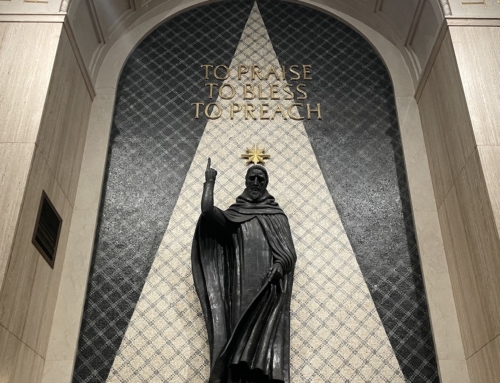Last week veteran NFL quarterback Fran Tarkenton wrote an article in the Wall Street Journal in which he mused on the intersection of faith and football. A religious man himself (“charismatic before charismatic was cool,” he says), Mr. Tarkenton raises some questions that not only have serious weight for football fans, but also provide an occasion for genuine theological reflection. “Does God care who wins football games?” he asks. Is which team wins important enough for God to care about? Should we look for divine causality in amazing plays like Roger Staubach’s 1975 “Hail Mary” pass and Franco Harris’s “Immaculate Reception” in 1972? Does having religious men on one team or the other increase the likelihood of winning? And finally, “If God gets credit for the win, does he also take blame for defeat?”
Since theology treats not only of God but of all things as related to God, let us see if the riches of the Catholic theological tradition can provide some satisfying answers to these questions, or, at least, help to advance the conversation.
The first question, “Does God care who wins a football game?” is an instance of the more general question of God’s providence over things in the world. Now, “providence” means God’s wise governance, and our gut feeling may suggest that certain categories of things fall beneath or outside God’s attention because they are not important enough. The teaching of the Church tells us otherwise, however. According to the Catechism, God’s providence is “concrete and immediate; God cares for all, from the least things to the great events of the world and its history” (CCC 303). Scripture, for its part, clearly declares that God not only knows everything, but also orders all of creation according to his wise, all-encompassing plan; God’s wisdom “spans the world from end to end mightily and governs all things well” (Wisdom 8:1).
Well, if God’s providential care extends to all things without exception, then it would certainly seem to extend to football games and their outcomes, too. (In light of this, and in light of God’s omniscience, perhaps we would do well to be more transparent in our prayers and simply tell God that we would like our team to win — qualifying our petition, of course, with the proviso that we accept his will, whatever it may be.) Some people may find the consequences of this universal providence a bit counterintuitive, but the truth is that our gut feelings are often influenced – and to a greater extent than we may like to admit—by popular notions current in society. In fact, we could all probably use a little purification of our feelings and hunches under the sure guidance of faith and reason.
One prevalent and influential notion in our culture is that God is practically absent from the world he created, uninvolved with it except when he intervenes or interferes to produce unusual results. On this view, the question of God’s causality is an either–or question: either God or a natural agent is responsible for a given event, but not both. It is the basic assumption behind Bart Simpson’s absurd prayer, “Dear God, we paid for all this stuff ourselves, so thanks for nothing.”
Actually, this is a rather simplistic view compared to the traditional teaching of the Church, because it views the causality of natural agents and the causality of God as operating (and therefore competing) on the same metaphysical level. In this way, it sets up a false and entirely unnecessary opposition between theological and scientific explanations; and, in so doing, it in no way earns the distinction of being a more “scientific” approach.
The Catechism, by contrast, adopts a both–and position, emphasizing the thoroughgoing compatibility of natural and divine causality. Thus, while God is the primary and universal cause of all things, in his abundant generosity he gives created beings the dignity of being causes themselves. Being created and finite, they are what we call “secondary” and particular causes:
“The truth that God is at work in all the actions of his creatures is inseparable from faith in God the Creator. God is the first cause who operates in and through secondary causes: “For God is at work in you, both to will and to work for his good pleasure” (CCC 308).
In Question Twenty-two of the First Part of his Summa Theologiae, St. Thomas Aquinas explores this truth in a more technical way, explaining how God’s providential ordering, though infallibly producing its intended effect, does not take away the contingency of contingent events, which include both chance events and intelligent, free-will decisions. In other words, God is not a competitor with our free will; rather, he is the reason why it is—and the reason why it is free. Therefore, we ought to see God’s causality at work not just in the extraordinary events of our lives—not just in the amazing runs, passes, and touchdowns—but in the ordinary, day-to-day, routine events as well. All the same, Mr. Tarkenton’s basic insight remains: God’s goodness shines forth especially in those events which are marvelous and wonderful.
With regard to the question of whether being devout or upright ought to translate into more wins on the field, we must observe that even victory in the Super Bowl is a worldly good. Therefore, the question falls under the more general consideration of whether upright or religious men have an advantage in obtaining worldly success. On this score, it is clear that God “makes his sun rise on the bad and the good, and causes rain to fall on the just and the unjust” (Matthew 5:45). This theme finds profound and moving expression in many of the Psalms, but those who feel a need for consolation of a more theological kind—and here we can’t help but think of the dejected fans of Tim Tebow—may find it in St. Augustine’s City of God, Book I, Chapters 8–10.
Of course, when we are engrossed in a good football game, it may sometimes be difficult to remember that anything exists besides God and football. Fortunately, however, God never loses sight of the whole, and never mistakes football for the ultimate end to which man is directed. He has wise reasons for everything. Sometimes, as in the Book of Tobit, we get to peek behind the curtain at the complex ways in which difficult-to-understand events work out providentially for the different people involved in them, but, ultimately, the reasons remain mysterious to us.
And now for the final question: “If God gets credit for the win, does he also take blame for defeat?” Mr. Tarkenton’s opinion is that God clearly gets credit for a win, but that things get more complicated when it comes to blame. We can develop this basic insight and come to a deeper understanding of the mystery it touches upon by turning to the theology of St. Thomas Aquinas. St. Thomas is very clear, first of all, that God is in no way the cause of moral evil, or sin; he only permits it, mysteriously, because he respects the freedom he has given to his creatures and because, by his divine power, he can bring good out of it (see CCC 311).
In point of fact, however, it is not a sin to lose a football game. It is an “evil,” but only in the sense that it is the absence of some particular good where that good would be fitting. In other words, if, in the context of a football game, winning is a fitting good, then not winning is a (non-sinful) evil precisely because it is a privation of that good. When considering such non-moral evil, we must remember that God has created a universe wherein the perfection of some things, such as football teams, require that other things, their opponents, fail. Football fans will, I think, agree that the universe would not be more perfect if every football game ended in a tie, or if football were a non-competitive activity. No, even if my team sometimes loses, I must acknowledge God’s wisdom in creating the world the way he has. As St. Thomas says, “God, by causing in things the good of the order of the universe, consequently and as it were by accident, [also] causes the corruption [or failure] of things, according to 1 Samuel 2:6: ‘The Lord killeth and maketh alive.'” (We should note that “accident” is a technical term for Aquinas, meaning something not essential; it does not imply that God erred).
The long and short of it is that if St. Thomas Aquinas were your offensive coordinator, and you tried to shift the blame to God for the interception you just threw, he would reply that, although the event was certainly governed by divine providence, the defect was not in God, who is all-wise and was acting with the perfection of the universe in view, but in the deficient secondary cause, i.e., you.
Finally, if we were to garner something serious from these not-entirely-serious reflections, perhaps it would be the following: a greater appreciation for the wise providence of God, a more perfect integration of faith with our daily life, and a deeper thankfulness for the goods God bestows on us—even when our team doesn’t win.
✠







